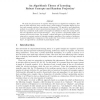Free Online Productivity Tools
i2Speak
i2Symbol
i2OCR
iTex2Img
iWeb2Print
iWeb2Shot
i2Type
iPdf2Split
iPdf2Merge
i2Bopomofo
i2Arabic
i2Style
i2Image
i2PDF
iLatex2Rtf
Sci2ools
123
Voted
FOCS
1999
IEEE
1999
IEEE
An Algorithmic Theory of Learning: Robust Concepts and Random Projection
We study the phenomenon of cognitive learning from an algorithmic standpoint. How does the brain effectively learn concepts from a small number of examples despite the fact that each example contains a huge amount of information? We provide a novel algorithmic analysis via a model of robust concept learning (closely related to "margin classifiers"), and show that a relatively small number of examples are sufficient to learn rich concept classes. The new algorithms have several advantages -- they are faster, conceptually simpler, and resistant to low levels of noise. For example, a robust half-space can be learned in linear time using only a constant number of training examples, regardless of the number of attributes. A general (algorithmic) consequence of the model, that "more robust concepts are easier to learn", is supported by a multitude of psychological studies.
Algorithmic Standpoint | FOCS 1999 | Robust Concepts | Small Number | Theoretical Computer Science |
Related Content
| Added | 03 Aug 2010 |
| Updated | 03 Aug 2010 |
| Type | Conference |
| Year | 1999 |
| Where | FOCS |
| Authors | Rosa I. Arriaga, Santosh Vempala |
Comments (0)

